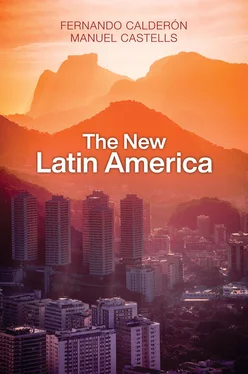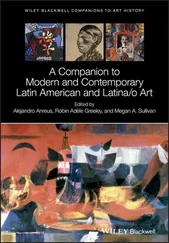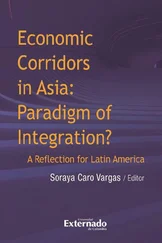It is worth emphasizing that in the area surrounding Carlos Casares, in the humid pampa in Argentina, informational development and the culture of business are both essentially home-grown. The corporation and the “corporate culture of Grobo” form a particular productive system for marketing and corporate management at a global scale, one developed in concert with the scientific and technological research taking place in Argentina’s universities (Wahren, forthcoming).
Unconventional oil and gas in Vaca Muerta is produced through a partnership between the state-owned company YPF and a pool of transnational corporations that use fracking technologies in ways that are already computerized, in keeping with the workings of the global market. Here there is also a space for exchange and negotiation with scientific and technological systems of innovation. The state-owned company engages in these exchanges and negotiations with its transnational partners, presided over by powerful and capable transnational companies like Chevron, from the United States (Cretini, 2018). From this perspective, these companies have been integrated into diverse territories and multicultural situations throughout Argentina in new ways, with implications that are especially important for the environment and politics.
The Environmental Limits of Informational Extractivism
The transition from industrial to informational extractivism has involved the formation of a new field of historical conflict between informational corporations, on the one hand, and, on the other, globalized – and networked – territorial actors. This involves a passage from the working class formed under industrial extractivism to a range of territorial actors operating under informational extractivism. This means a working class that is organized and integrated through functional differentiation; these workers form territorial organizations of various kinds: communitarian organizations, local associations, and organizations formed on the internet that bring together people with shared opinions.
We also see the emergence of various kinds of informational corporations with various internal structures and relationships to other companies. These corporations put information to different technological and economic uses, and they participate in different kinds of global networks. This leads to the emergence of institutions, subjectivities, and social organizations that play different roles in conflicts. That is, we also see the emergence of various social and territorial organizations, technological economies, and global networks.
All of this implies a new relationship between structural reality and subjectivity, or the possibilities and capacities of informational agents. The categories of isolated masses or modern, industrial unions, which were key to explaining industrial extractivism, are obsolete or have become subordinate to new forms created by the technological economy of information and new social networks of power.
On the ground, the effects on local societies vary, and the results range from integration to conflict, distrust, and the fragmentation of communities. In Carlos Casares, for example, we find an integrated society; in Vaca Muerta, we find a society that is somewhat integrated but also marked by conflicts; and in Salar de Olaroz, such conflicts have led to community fragmentation and distrust, in a social context with little integration and a great deal of potential for further conflict. A key factor in all of these contexts is the presence of a form of extractivism that degrades the environment but at the same time provides resources for policies that promote social integration and the diversification of production or the strengthening of the market. All of this leads to changes in and redefinitions of territorial boundaries in a new informational context. This also means economies and cultures that are altered by networks. Here both real and virtual borders of extraction change in different ways. The nation-state is insufficient in such a context and has increasing difficulty dealing with these kinds of changes.
The examples that we have considered in this chapter reflect the multicultural dynamics of Latin America, where a “new communitarianism” has emerged, one that is also ecological and that is marked by these basic traits: the defense of land, the recognition of various social and environmental demands, the critique of the model of development that we have called informational extractivism, and, above all, a communitarian cultural tendency that opposes environmental despoliation and seeks to valorize forms of life based on ecological thought.
1 1. The main source for the history that we recount in this section is the study edited by F. Calderón, Extractivismo informacional y territorialidades en Argentina. Un estudio comparativo sobre el litio en Olaroz, el gas y el petróleo en Vaca Muerta y la soja en Casares. A previous version was presented at Asociacion Latinoamericana de Sociologia (ALAS) XXXI Congreso. Panel: “America Latina en la era de la Informacion y Multiculturalismo,” Montevideo, 2017. This section is based on case studies on the production of lithium, soy, and unconventional hydrocarbons. These studies are: “El Extractivismo Agrícola Informacional en la Argentina: el caso de Los Grobo y las disputas territoriales socioambientales en la era de la Información,” by Juan Wahren; “Extractivismo informacional, territorio y desarrollo: el caso de YPF S.A. en Vaca Muerta,” by Ignacio Cretini; and “Minería del litio en el Salar de Olaroz,” by Debora Pragier and Juan Pablo Deluca.
2 2. For more detail, see the section “Long Life, Expandable & Sustainable Resource” at: https://salesdejujuy.com/projects/
3 3. It is worth mentioning, however, that some of these communities have managed to acquire visibility for their demands through collaboration with other actors, including the Multisectorial contra el Fracking (made up of students, the members of the Asamblea por Agua, and workers from Zanon, among others), during protests that took place in 2013 against an agreement between YPF SA and Chevron (Cretini, 2018).
4 4. On the one hand, the members of the CTA and indigenous communities report on different oil pollution sites. On the other hand, representatives of the corporation and of departments within the university contend that there is no surface water pollution in the area, and probably no groundwater pollution either (Cretini, 2018).
Конец ознакомительного фрагмента.
Текст предоставлен ООО «ЛитРес».
Прочитайте эту книгу целиком, на ЛитРес.
Безопасно оплатить книгу можно банковской картой Visa, MasterCard, Maestro, со счета мобильного телефона, с платежного терминала, в салоне МТС или Связной, через PayPal, WebMoney, Яндекс.Деньги, QIWI Кошелек, бонусными картами или другим удобным Вам способом.












